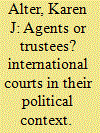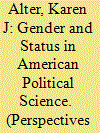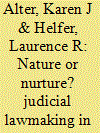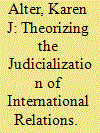|
|
|
Sort Order |
|
|
|
Items / Page
|
|
|
|
|
|
|
| Srl | Item |
| 1 |
ID:
080890


|
|
|
|
|
| Publication |
2008.
|
| Summary/Abstract |
In International Relations applications, theorists employing Principal- Agent (P-A) theory have posited that the fact of delegation defines a relationship between states (collective Principals) and international organizations (Agents) where recontracting threats are the predominant way states influence IOs. Developing a category of delegation to international Trustees, I argue that recontracting tools will be both harder to use and less effective at influencing the Trustees. Trustees are (1) selected because of their personal reputation or professional norms, (2) given independent authority to make decisions according to their best judgment or professional criteria, and (3) empowered to act on behalf of a beneficiary. These three factors account for the different politics between Principals and Trustees, a politics aimed at either keeping issues outside of the domain of the Trustee or at rhetorically engaging the Trustee's authority in an effort to persuade the common `beneficiary' whose loyalty and respect both States and the Trustee seek. In explaining why recontracting threats are not central to Principal-Trustee relations, the analysis bounds the realm in which we might expect P-A theory to apply, and provides a theoretical basis to question the `rational expectations' claim that ICs are tailoring their decisions to reflect the wishes of powerful states and avoid adverse recontracting
|
|
|
|
|
|
|
|
|
|
|
|
|
|
|
|
| 2 |
ID:
175831


|
|
|
|
|
| Summary/Abstract |
We investigate gender disparities in status construction in American political science, focusing on three questions: 1) Do institutions within the discipline of political science—including departments, APSA, editorial boards, and academic honor societies–reflect or remedy gender disparities that exist in many forms of recognition, including appointments to top leadership and citations? 2) Are institutions with centralized and accountable appointment mechanisms less gender skewed compared to networked and decentralized selection processes where implicit bias may go unchecked? 3) Does leaning in help? Does the effort of women to publish and to claim a seat at leadership tables increase the likelihood that higher-level status positions will follow? We find that the distribution of highest-status positions is still gender skewed, that women are over-represented in positions that involve more service than prestige, that “leaning in” by serving as section chair, on editorial boards, or on academic councils is not necessarily a gateway to higher-status appointments, and that accountability promotes greater gender parity. The study raises questions about the goal of gender parity when it comes to lower-status service, and about the types of contributions our discipline rewards.
|
|
|
|
|
|
|
|
|
|
|
|
|
|
|
|
| 3 |
ID:
099871


|
|
|
|
|
| Publication |
2010.
|
| Summary/Abstract |
Are international courts power-seeking by nature, expanding the reach and scope of international rules and the courts' authority where permissive conditions allow? Or, does expansionist lawmaking require special nurturing? We investigate the relative influences of nature versus nurture by comparing expansionist lawmaking in the European Court of Justice (ECJ) and the Andean Tribunal of Justice (ATJ), the ECJ's jurisdictional cousin and the third most active international court. We argue that international judges are more likely to become expansionist lawmakers where they are supported by substate interlocutors and compliance constituencies, including government officials, advocacy networks, national judges, and administrative agencies. This comparison of two structurally identical international courts calls into question prevailing explanations of ECJ lawmaking, and it suggests that prevailing scholarship puts too much emphasis on the self-interested power-seeking of judges, the importance of institutional design features, and the preferences of governments to explain lawmaking by international courts.
|
|
|
|
|
|
|
|
|
|
|
|
|
|
|
|
| 4 |
ID:
168539


|
|
|
|
|
| Summary/Abstract |
This article introduces a Thematic Section and theorizes the multiple ways that judicializing international relations shifts power away from national executives and legislatures toward litigants, judges, arbitrators, and other nonstate decision-makers. We identify two preconditions for judicialization to occur—(1) delegation to an adjudicatory body charged with applying designated legal rules, and (2) legal rights-claiming by actors who bring—or threaten to bring—a complaint to one or more of these bodies. We classify the adjudicatory bodies that do and do not contribute to judicializing international relations, including but not limited to international courts. We then explain how rights-claiming initiates a process for authoritatively determining past violations of the law, identifying remedies for those violations, and preventing future violations. Because judicializing international relations occurs in multiple phases, in multiple locations, and involves multiple actors as decision-makers, governments often do not control the timing, nature, or extent to which political and policy decisions are adjudicated. Delegation—and the associated choice of institutional design features—is thus only the first step in a chain of processes that determine how a diverse array of nonstate actors influence politically consequential decisions.
|
|
|
|
|
|
|
|
|
|
|
|
|
|
|
|
|
|
|
|
|